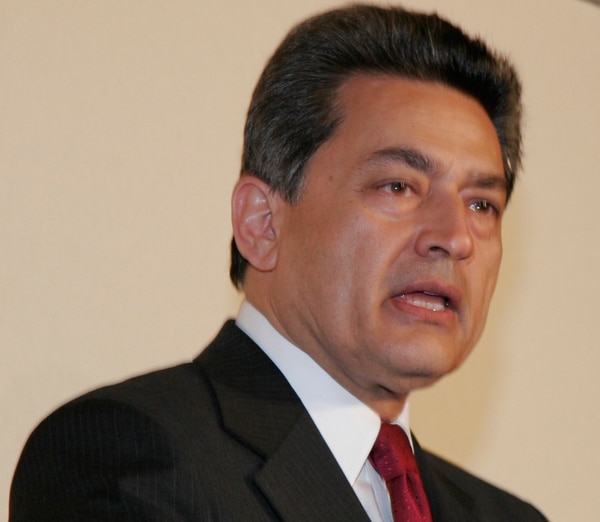Former McKinsey head and Goldman Sachs Director Rajat Gupta has been charged with one count of consipracy and five counts of securities fraud.
Gupta, the highest-ranking corporate executive indicted for insider trading, surrendered Wednesday morning to the Federal Bureau of Investigation. He plead not guilty to all charges before U.S. District Judge Jed Rakoff and was released on a $10 million bond secured by his 2.3 acre home in Westport, Conn., which is currently appraised at $12.5 million. He was ordered to surrender his passport and is barred from travelling outside the continental United States. A trial date has been set for April 9, 2012.
In a statement, Manhattan U.S. Attorney Preet Bharara said: “Rajat Gupta was entrusted by some of the premier institutions of American business to sit inside their boardrooms, among their executives and directors, and receive their confidential information so that he could give advice and counsel for the benefit of their shareholders…. He broke that trust and instead became the illegal eyes and ears in the boardroom for his friend and business associate, Raj Rajaratnam, who reaped enormous profits from Mr. Gupta’s breach of duty.”
The criminal complaint (see copy of complaint below) accuses Gupta of disclosing “inside information to Rajaratnam, with the understanding that Rajaratnam would use the inside information to purchase and sell securities, and thereby receive illegal profits and/or illegally avod losses” relating to Proctor & Gamble and Goldman Sachs. It alleges that Gupta “wilfully and knowingly did combine, conspire, confederate and agree together and with each other to commit” securities fraud.
Separately, the Securities and Exchange Commission filed a civil complaint (copy below) jointly against Gupta and Galleon founder Raj Rajaratnam, alleging an “extensive insider trading scheme.” In a statement, Robert S. Khuzami, Director of the SEC’s Division of Enforcement, said: “Gupta was honored with the highest trust of leading public companies, and he betrayed that trust by disclosing their most sensitive and valuable secrets to the disadvantage of investors, shareholders, and fellow directors. Directors who exploit board room confidences for private gain can be certain they will ultimately be held responsible for their illegal actions.”
The SEC complaint, filed with the U.S. District Court of the Southern District of New York, alleges: “Specifically, Gupta disclosed to Rajaratnam material nonpublic information concerning Berkshire Hathaway Inc’s (“Berkshire”) $5 billion investment in Goldman Sachs before it was publicly announced on September 23, 2008. Gupta also provided to Rajaratnam material non-public information concerning Goldman Sachs’s financial results for both the second and fourth quarters of 2008. Rajaratnam caused the various Galleon hedge funds that he managed to trade on the basis of material nonpublic information, generating illicit profits and loss avoidance of more than $23 million. In addition, Gupta disclosed to Rajaratnam material nonpublic information concerning Procter & Gamble’s financial results for the quarter ending December 2008. Rajaratnam relayed this information to others at Galleon, who in turn caused Galleon funds to trade on basis of that information, generating illicit profits of over $570,000.”
Both the civil and criminal complaint allege that Gupta had an extensive business entanglements with Rajaratnam, including $2.4 million in investments in Galleon and almost $33 million in other partnerships with Rajaratnam in various private equity funds. The SEC complaint asserts: “Gupta had a variety of business dealings with Rajaratnam and stood to benefit from his relationship with Rajaratnam. In addition, Gupta was an investor in, and a director of, Galleon’s GB Voyager Multi-Strategy Fund SPC, Ltd., a master fund with assets that were invested in numerous Galleon hedge funds, including the Galleon funds that traded – and handsomely profited – based on Gupta’s illegal tips.”
The SEC complaint seeks to bar Gupta from securities trading and serving as an officer of public companies and disgorgement of profits from the insider trading. He faces upto 20 years in prison for each count of securities fraud.
In an email statement to reporters, Gupta’s attorney Gary Naftalis said: “Any allegation that Rajat Gupta engaged in any unlawful conduct is totally baseless. He did not trade in any securities, did not tip Mr. Rajaratnam so he could trade, and did not share in any profits as part of any quid pro quo.”
In the first interview since his conviction, Galleon’s Raj Rajaratnam, who was sentenced to 11 years for insider trading, claimed he was preessured by the FBI to implicate Gupta. (See here.)
Listen to the wiretap of a telephone call on July 29, 2008, between Rajat Gupta and Raj Rajaratnam regarding a rumor that Goldman was considering acquiring a commercial bank here. This may the only recording of the two, since only Rajaratnam’s cell phone was being tapped by the FBI. The other conversations between Gupta and Rajaratnam occurred from his home or office and were not recorded. Instead, the government allegations are centered around the timing of those calls, soon after Goldman Sachs board meetings in which Gupta participated, and the Galleon stock trading patterns immediately following the calls. For instance, the SEC complaint alleges, Gupta called Rajaratnam 16 seconds after learning of Buffet’s investment of $5 billion in Goldman Sachs during a telephonic Board meeting on Sept. 23, 2008.
“Within a minute after that telephone conversation, at 3:56 p.m. and 3:57 p.m., and just minutes before the close of the markets, Rajaratnam caused certain Galleon hedge funds to purchase more than 217,200, Goldman Sachs shares,” according to the complaint.
Rajaratnam placed other trades shortly after his telephone conversations with Gupta on several other occasions, the complaint alleges. Prosecutors estimate that Galleon profited or avoided losses worth $23 million from the insider information supplied by Gupta.
